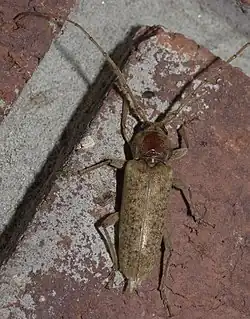Enaphalodes rufulus
| Enaphalodes rufulus | |
|---|---|

| |
| Scientific classification | |
| Kingdom: | Animalia |
| Phylum: | Arthropoda |
| Class: | Insecta |
| Order: | Coleoptera |
| Suborder: | Polyphaga |
| Infraorder: | Cucujiformia |
| Family: | Cerambycidae |
| Genus: | Enaphalodes |
| Species: | E. rufulus
|
| Binomial name | |
| Enaphalodes rufulus (Haldeman, 1847)
| |
Enaphalodes rufulus or Red Oak Borer[1] is a species of beetle in the family Cerambycidae. Native to North America, the Red Oak Borer attacks various oak species including Quercus velutina, Quercus rubra, and Quercus coccinea.[2]
It was described by Haldeman in 1847.[3]
Appearance
Red Oak Borers have characteristic eggs and larvae of woodboring cerambycids. Adults are sexually dimorphic.[4]
- Oblong, cream-colored eggs that are 0.1 in (2-3 mm) long.
- Cream-colored larvae that have dark colored mandibles and small jointed legs on the thorax. More mature larvae can measure up to 1.5-2 inches (4-5 cm) long.
- Pupae are tan colored and furrowed with extremities visible externally.
- Adults measure 0.8-1.2 inches (2-3 cm); color is a faded combination of tan, brown, and red. Female antennae are approximately body length, while males' measure twice the body length. Females tend to have larger bodies.
Identification
Red Oak Borer attacks can be identified by key indicators.[4]
- Appearance of crescent-shaped holes, approximately 0.1 inches (3 mm) long, on bark surface
- Late Instar feeding galleries are teardrop-shaped and relatively large in size.
- Adults exiting the tree create large circular holes.
References
- ^ "Home, Yard & Garden Newsletter at the University of Illinois". hyg.ipm.illinois.edu. Retrieved 19 May 2021.
- ^ "Forest Pest Insects in North America: a Photographic Guide: Red oak borer". www.forestpests.org. Retrieved 18 August 2025.
- ^ Bezark, Larry G. A Photographic Catalog of the Cerambycidae of the World Archived 2013-08-27 at the Wayback Machine. Retrieved 22 May 2012.
- ^ a b "Forest Insect and Disease Leaflet 163: Red Oak Borer" (PDF). www.fs.usda.gov. Retrieved 18 August 2025.